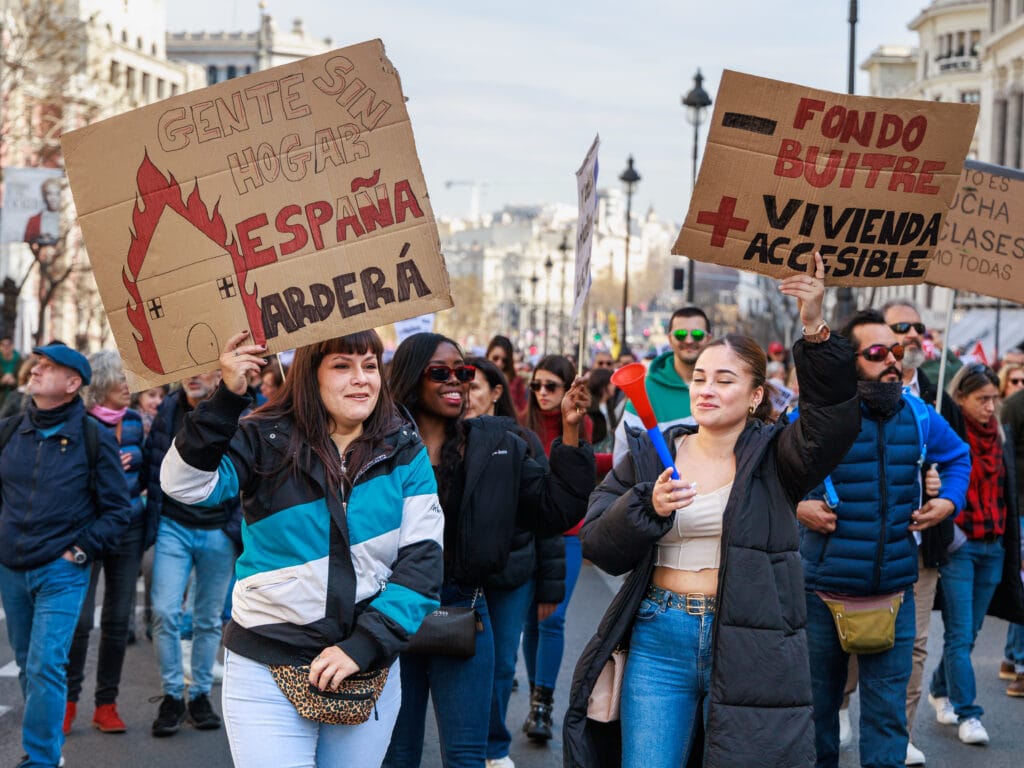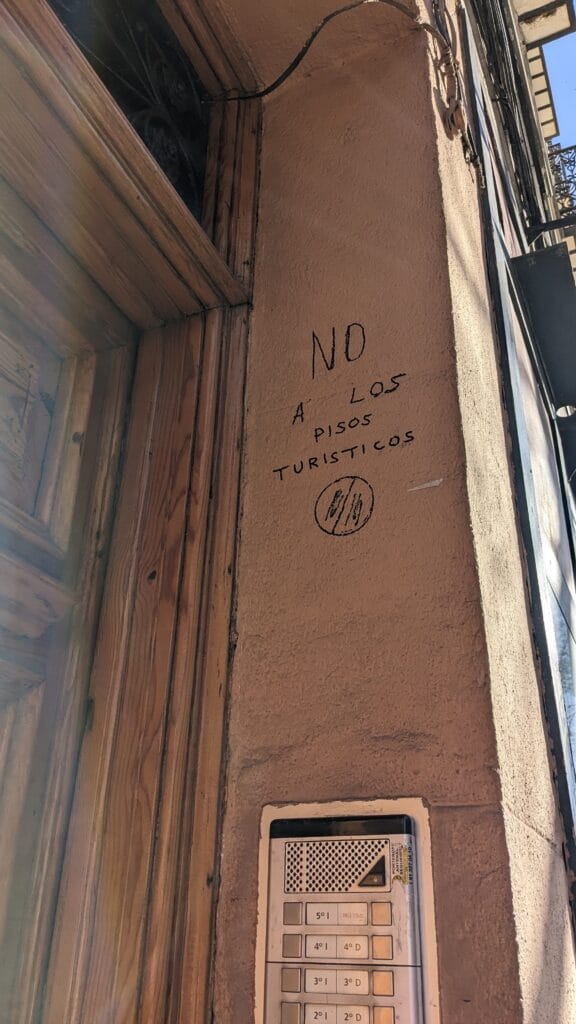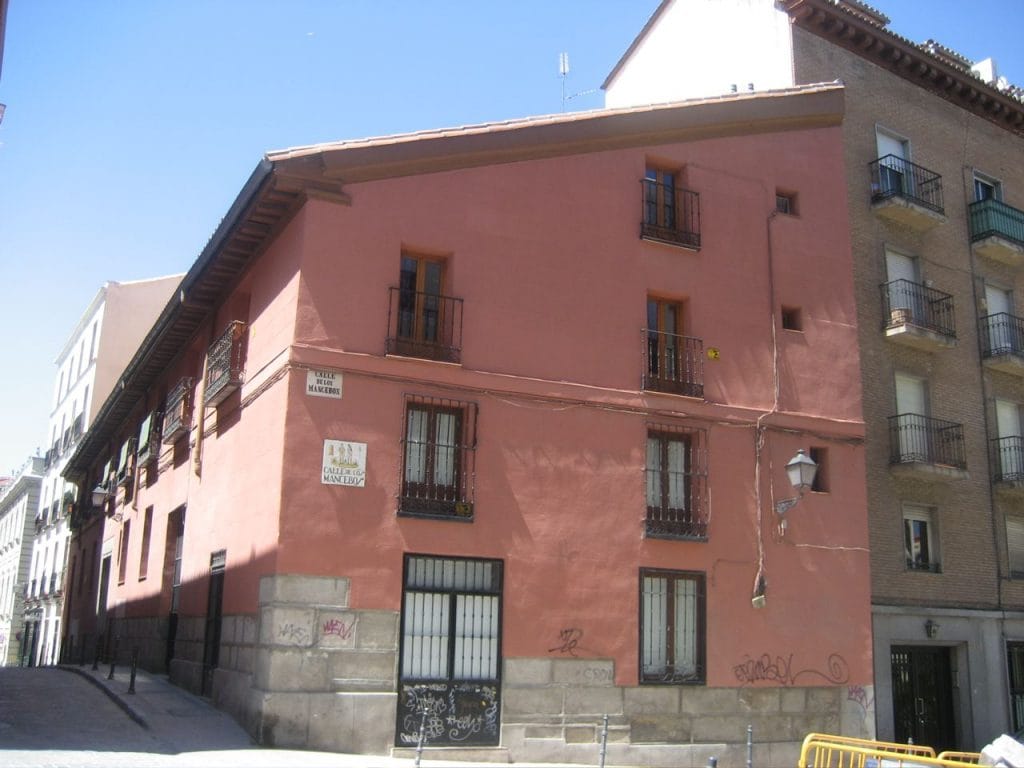
In cities around the world, a housing crisis is brewing, and platforms like Airbnb are increasingly being identified as part of the problem. What started as a seemingly innocent “sharing economy” concept has evolved into a force that’s reshaping urban housing markets—and not for the better. In my years living in Madrid, I’ve seen the impacts of this company on real lives, so I wanted to do a piece on why you might want to reconsider using Airbnb for your next vacation.
The Housing Crisis Reality
The housing situation in many popular tourist destinations has reached a breaking point. Take Madrid as an example: over the past decade, rental prices have shot up while salaries have remained stagnant. Take the apartment we rented back in 2012, which cost €780 a month. Now similar apartments go for around €1,300 a month, and this is outside the city center! In the once affordable yet central neighbourhood of Lavapiés, you’re looking at rents between €1,200-€2,000 for a 2-bed apartment.
With typical middle-class salaries in Madrid ranging from €1,500 to €4,000 before taxes, housing costs are consuming an unsustainable portion of residents’ incomes. The result? Local residents—especially young people—are being forced to:
- Live with their parents much longer than previous generations
- Share apartments (which was previously uncommon in Spain)
- Move far from city centers, adding lengthy commutes to their daily lives
- Rely on their parents to purchase property for them (the fortunate few)

How Airbnb Contributes to the Problem
While Airbnb isn’t solely responsible for the housing crisis, it significantly exacerbates existing problems:
Removal of Long-Term Housing Stock: Property owners are converting what would be long-term rental properties into short-term vacation rentals, reducing available housing for locals.
Driving Up Property Values and Rents: The profitability of short-term rentals pushes up both purchase prices and rental rates in tourist-heavy neighborhoods.
Enabling “Vulture Funds”: Investment companies are buying entire buildings to convert them into tourist accommodations, completely removing them from the residential market.
Accelerating Gentrification: As tourist rentals proliferate, neighborhood businesses shift their focus from serving locals to catering to tourists, changing the character and affordability of entire districts.
The Human Cost
Behind the statistics are real people facing genuine hardship. If you listen to the podcast, I talk about two cases I personally know of where people have been forced out of their flats in extremely stressful situations by greedy landlords. Sadly, these aren’t isolated incidents but representative examples of what happens when housing becomes primarily an investment vehicle rather than a basic necessity.
The Community Response
Communities aren’t taking these changes lying down. In cities like Madrid, Barcelona, and the Canary Islands, protests against the housing crisis have drawn thousands of participants. Graffiti with messages like “Tourists go home” and “Yes to tourism, but not like this” reflects growing frustration.

What You Can Do Instead
Tourism itself isn’t the problem—it’s how we approach it that matters. If you want to visit the city I urge you to avoid Airbnb, which has a terrible reputation when it comes to compliance with local housing policy, and opt instead for hotels or hostels. I do realise this does push up the cost of a holiday but it’s something you can do to have a real positive impact on the city.
The Broader Issue
The Airbnb problem is just one manifestation of a larger issue: treating housing as a commodity rather than a human right. Recent attempts to regulate the market, like Spain’s 2023 “Ley de la Vivienda” housing law, have had unintended consequences. The law aimed to prevent landlords from passing agency fees to renters and to limit rent increases, but property owners quickly found loopholes by offering 11-month “flexible” contracts instead of standard 12-month leases. This allows them to suddenly hike rents when the contract is up and pass on the costs of agency fees to renters rather than paying for this themselves as stipulated in the Ley de la Vivienda.
Reflecting the popularity of this devious move, rental listings on traditional platforms have decreased by 25%, while so-called “seasonal rentals” have increased by 56%—making the market even tighter for locals seeking stable housing.
The Bottom Line
When you book an Airbnb in a city experiencing a housing crisis, you’re indirectly contributing to the problem. While individual tourists aren’t to blame for systemic issues, our collective choices have real impacts on communities.
Tourism remains vital to many local economies, and visitors are generally welcomed with open arms—but increasingly, communities are asking tourists to make more ethical choices about their accommodations.
By choosing alternatives to Airbnb and similar platforms, you can enjoy your vacation while knowing you’re not inadvertently making life harder for the very communities you’ve come to experience.
Remember: tourism should benefit both visitors and locals alike. When that balance is lost, something valuable is sacrificed in the process.
Are you visiting Madrid and want to see another side to the city than the cookie-cutter mass-tourism experiences? Why not try one of my audio tours or buy a copy of Quiet Madrid for another perspective?





The housing crisis has many issues and I doubt Airbnb contributes much to it. Long story short: demand of (lower priced) flats is much higher than the current offer. Airbnb’s flats are only in the higher priced and city center fringe. There is a lot of PR by hotels right now and you probably fell into it. Airbnb is fighting back by the way: https://www.linkedin.com/posts/fernandogallardo_airbnb-arremete-contra-los-hoteles-y-los-activity-7339206053072363522-6U6k/
Thanks for your comment. Of course, it is a complex issue and rising demand puts pressure on things, not to mention the lack of social housing. However, Airbnb does exacerbate an already difficult situation. I believe regulation is the way forward.